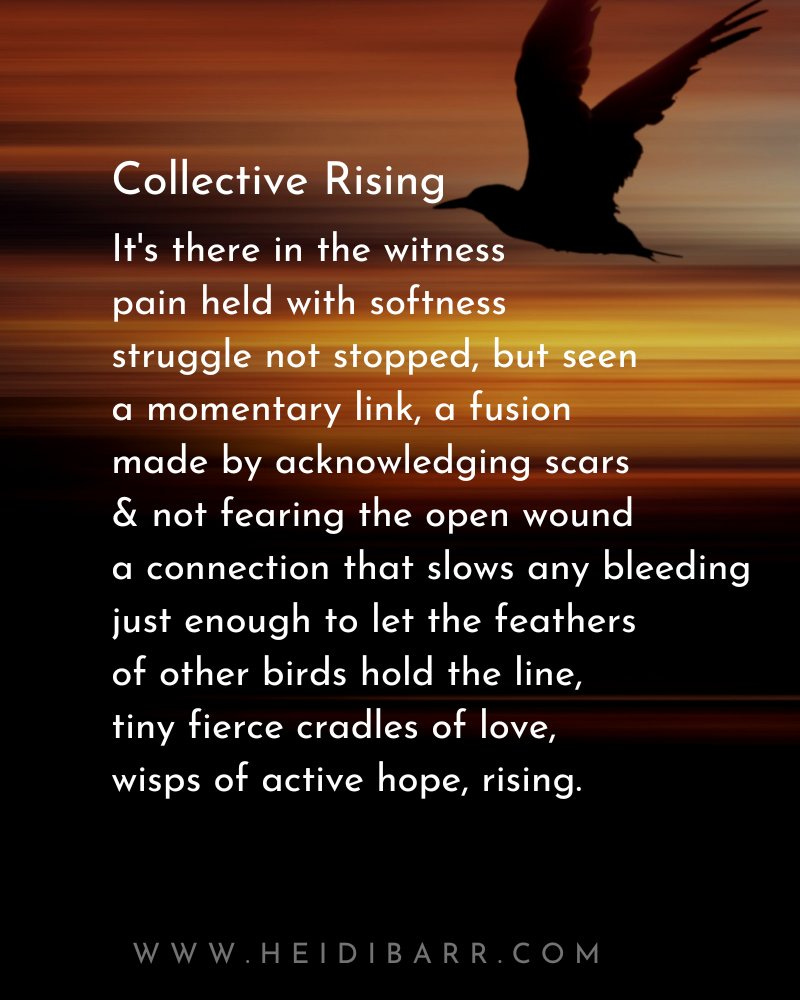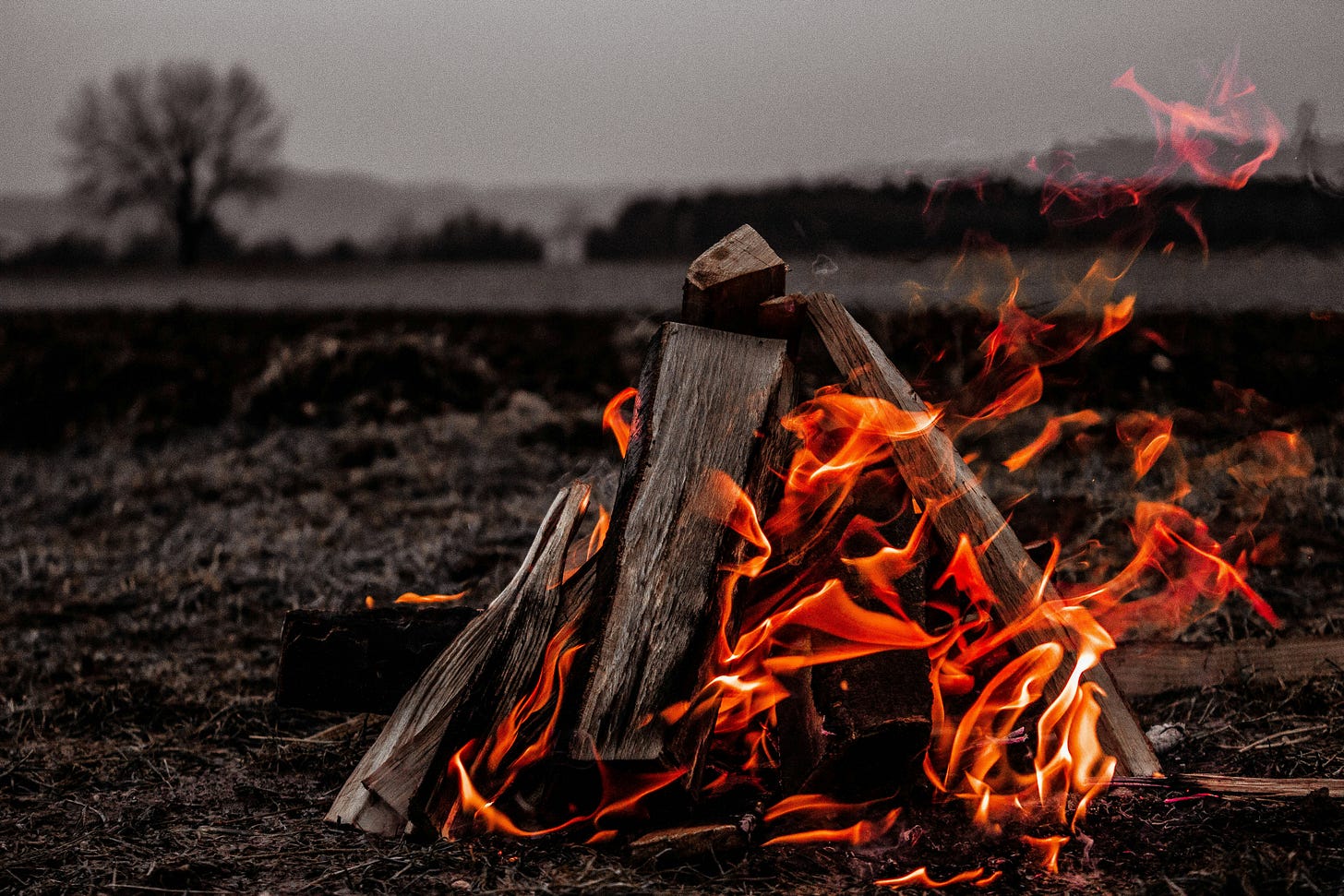Signal Fires & Dark Times
Collisions of Declining Baselines
One of the most calming and powerful actions you can do to intervene in a stormy world is to stand up and show your soul.
-Clarissa Pinkola Estes
I’ve written about declining baselines a few times before, one of the first showing up in an essay included in my 2017 book, Woodland Manitou – quoting Derrick Jensen describing the phenomenon as, “the process of becoming accustomed to and accepting as normal worsening conditions. Along with normalization can come a forgetting that things were not always this way. And this can lead to further acceptance and further normalization, which leads to further amnesia, and so on.” From the number of insects that you find on your windshield after a long summer drive (fewer) to your response to a mass shooting (a resigned, “again?”), to hurricanes and wildfires and tornados that grow in number and ferocity every year, opportunities to become accustomed to worsening conditions seem abundant.
In any dark time, there is a tendency to veer toward fainting over how much is wrong or unmended in the world.
Do you remember when there were shootings in Paris (and ___ and ____ and ____)? You probably do, it wasn’t all that many years ago, and the world watched as the city of light went into lock-down and mourning. Do you remember when entire towns burned to the ground during the largest wildfire in California history? You probably do, because the world watched as firefighters worked around the clock to contain the blaze. Do you remember all the times Black folks or members of the AAPI community, or Native women, or ___________, people who are just going about their daily lives, from jogging to reaching for a wallet to sleeping in their own beds, have died at the hands of police or neighbors or random acts of violence? You probably do because it happens again, and again, and again. Do you remember all of the other tragic, rage-fueled, violent events that filled in the years between then and now? You probably do, at least vaguely, unless you were directly affected, in which case, it’s likely you think about it more than you want to. It feels like my now 12 year old will never know a world that doesn’t respond to hate and violence and difference with more hate and violence. Or indifference, which has its own set of troubling outcomes.
Do not focus on that. There is a tendency to fall into being weakened by dwelling on what is outside your reach, by what cannot yet be. Do not focus there. That is spending the wind without raising the sails.
Once again the world has witnessed acts of violence that is hard to fathom. Rafah continues to be ravaged by Israel, and more and more people, more and more children, die by violence every day. I am horrified at what’s going on in Palestine, in Sudan, in Congo. But I’m not shocked (declining baseline). All of this somehow feels far away and too close at the same time, and I am left wondering if things will ever start to change for the better. I want my daughter to grow up in a world where love and connection has more power over fear and violence. When these things keep happening, it’s hard to do anything but despair.
You are right in your assessments. The lustre and hubris some have aspired to while endorsing acts so heinous against children, elders, everyday people, the poor, the unguarded, the helpless, is breathtaking. Yet, I urge you, ask you, gentle you, to please not spend your spirit dry by bewailing these difficult times. Especially do not lose hope.
Violence remains a normality in too many parts of the world, perpetrated and received by a diverse array of beliefs and collectives. Distraction tends to win more often than not1, unless you are right there in the thick of the issue. Then survival is all that matters. It’s hard to digest all that has come to pass in the last 24 hours, 12 months, 20 years. Truly, I don’t think it’s actually possible to digest it, nor should it be. I think this means we need to grieve that which has been lost, that which has died (from individuals to ideas to trust to ways of doing things), that which we or our children will never have, and that which is at this very moment fading away. Stephen Jenkinson says, “Grief requires us to know the time we are in. We don’t require hope to proceed. We require grief to proceed.”2
We are in a dark time. But as Dr. Estes points out, “we were made for these times.” Candles and flashlights and signal fires abound.3
Because we still have the capacity to practice active hope. As Joanna Macy writes, “Active hope doesn’t require our optimism, and we can apply it even in areas where we feel hopeless. The guiding impetus is intention; we choose what we aim to bring about, act for, or express. Rather than weighing our chances and proceeding only when we feel hopeful, we focus on our intention and let it be our guide.”
And we don’t stop at intention, since as Layla Saad points out, “doing this work isn’t about your words or your intentions. It’s about your actions and your impact.”
These times require us to acknowledge our grief and channel it into active hope. These times require us to acknowledge our privilege were we have it, and listen to those who don’t. These times require us to acknowledge that rage is part of this story, and something that has to have an outlet that doesn’t lead to more harm for the tide to turn. We need to bear witness [in the ways that work for us] to what is going on, even on the toughest of days, and in doing so acknowledge and honor the deep parts of what being human on this earth is all about. It is not about fear and hate. It is about love.4
Soul on deck shines like gold in dark times. The light of the soul throws sparks, can send up flares, builds signal fires, causes proper matters to catch fire. To display the lantern of soul in shadowy times like these – to be fierce and to show mercy toward others; both are acts of immense bravery and greatest necessity.
By allowing love to dictate our actions and response to the actions of others, and by practicing active hope, we are less likely to let ourselves get swept into thinking that this type of situation is business as usual. When we can allow ourselves to grieve, we are less likely to be swept into the patterns of answering hate with more hate and violence with more violence; apathy with inaction. By refusing to let our baselines decline any further, we can be present in a way that will help this very broken world to start to heal. I don’t know what this looks like. But I believe it is possible.
Ours is not the task of fixing the entire world all at once, but of stretching out to mend the part of the world that is within our reach. Any small, calm thing that one soul can do to help another soul, to assist some portion of this poor suffering world, will help immensely. It is not given to us to know which acts or by whom, will cause the critical mass to tip toward an enduring good. Struggling souls catch light from other souls who are fully lit and willing to show it.
Reset your baseline if you need to. Don’t turn away from the atrocities that continue to happen and have been happening for hundreds of years.5 Reject white supremacy. Reject gun violence. Reject war as business as usual. Learn what it means to be anti-racist and practice doing it until it becomes your way of life. Explore what working for peace means in your life. Show your soul, stand for love. Keep your signal fire burning so others can see that active hope is available, even if it means traversing the forgotten path up the back of the mountain.
The God I Know (Despite Everything)
The God I know
doesn’t occupy lands
and support the oppression
of a people for decade
after decade.
The God I know
doesn’t kill the children
of one people
to liberate the children
of another.
The God I know
doesn’t condone violence
of any kind as justice
no matter how righteous
that violence seems to some.
The God I know
sits with parents of children lost and living
on both sides of the blockade
as they do their best to tend pain
and embody love in a war zone.
The God I know
keeps laying bricks
on the bridge to peace
even when more parts of that bridge
are blasted away every day.
The God I know
helps bear loads too heavy
to carry up mountains
we may not summit
in this lifetime.
The God I know
takes the packs of the weary,
sets the table with hope, and
invites us to sit together to listen
long enough to find a new way forward.
Quotes in the main body of text are from Clarissa Pinkola Estes’ (post-trauma specialist and Jungian psychoanalyst) essay titled “We Were Made for These Times.”
I’m continually distracted by rejection letters from job applications, the hordes of mosquitos that have descended upon Minnesota, and myriad other everyday issues.
This and parts of the next few passages are included in Collisions of Earth and Sky, a chapter called Activating Hope Through Grief and Gratitude.
Could I believe this quote if I were in the midst of active violence while my people were being killed daily? I don’t know.
This is all easy to write and much, much harder to actually practice. By writing it, I’m inviting myself into the practice—I don’t have it figured out either.
However, I don’t think this means you need to stay glued to the news 24/7 or watch others suffering repeatedly. In our hyperconnected world, boundaries and taking care of your mental health are important, too.





You and I seem to be on the same wavelength again (with what I wrote yesterday!). Thanks for sharing these thoughts, Heidi. You've done it so beautifully and delicately. Channeling grief into hope - I needed this reminder. Thank you.